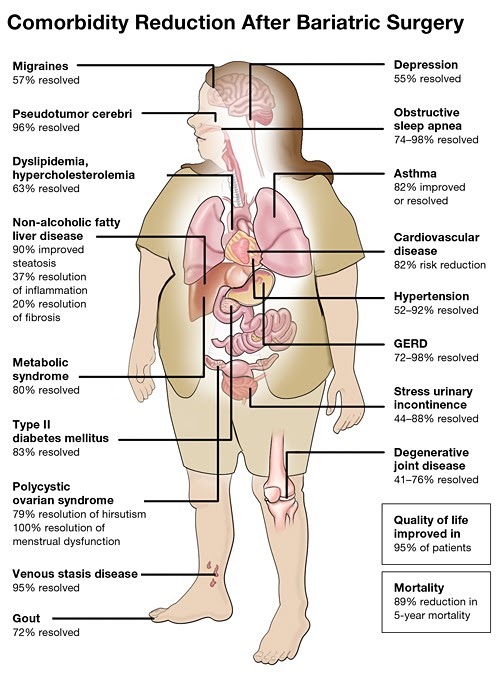Obesity is a disease. As such, it is associated with a number of potentially serious comorbidities (related health conditions), the severity of which can be dramatically reduced or even eliminated through weight loss achieved after bariatric surgery.
Obesity Comorbidities
Conditions for which people with obesity may be at a higher risk include:
Cancer
According to the National Cancer Institute, obesity may increase a person’s risk for more than a dozen different forms of cancer. Individuals with obesity may be at increased risk of developing breast, cervical, colon, endometrial, esophageal, gallbladder, kidney, liver, ovarian, pancreatic, prostate, rectal, and uterine cancer. 1
Diabetes
Type 2 diabetes, also known as adult-onset diabetes, is a result of insulin resistance that prevents the body from controlling blood sugar levels. Research conducted at Harvard University found that up to 30% of people who are overweight have diabetes, and up to 85% of people with diabetes are overweight. 2,3 ,
Heart Disease
Heart (cardiovascular) disease is a leading cause of death in the United States. For years, the link between obesity and heart disease was attributed to the increased incidence of conditions like high blood pressure and high cholesterol in people with obesity. However, recent and ongoing research now shows that there is a direct link between obesity and heart disease, with obese women at a 50% higher risk of coronary heart disease and men with obesity at a 72% higher risk. 4
High Blood Pressure
High blood pressure, or hypertension, can increase the risk of heart attack, stroke, and other serious health conditions, and is more common in patients with obesity. High blood pressure increases pressure on arteries, as does obesity. While it is possible to treat hypertension with medications, weight loss surgery is the most effective way for individuals with obesity to lower their blood pressure. 5
Sleep Apnea & Other Breathing Problems
Obstructive sleep apnea is most common in people with obesity. When the airway relaxes during sleep, fat deposits in the neck can obstruct the upper airway. Furthermore, excess weight in the upper body can compress the chest wall, decreasing lung volume and making it more difficult for the body to properly oxygenate. Sleep apnea also increases the risk of heart disease, insulin resistance (diabetes), high cholesterol, and other conditions. Massive weight loss is an effective treatment for OSA in individuals with obesity. 6
Additional Obesity Health Risks
In addition to the serious and potentially life-threatening conditions listed above, people with obesity may be at a higher risk for: 7
- Acid Reflux
- All causes of death (mortality)
- Anxiety
- Arthritis
- Asthma
- Body pain
- Clinical depression
- Infertility
- Immobility
- Gallbladder disease
- GERD
- Gout
- Heartburn
- High cholesterol
- High triglycerides
- Joint pain
- Low HDL cholesterol
- Low quality of life
- Mental illness
- Migraine
- Osteoarthritis
- PCOS (polycystic ovarian syndrome)
- Pseudotumor cerebri
- Reduced physical function
- Sexual dysfunction
- Stress urinary incontinence
- Stroke

Obesity and COVID-19
There are a number of conditions associated with obesity that can make the body more vulnerable to a virus like the coronavirus responsible for the current COVID-19 outbreak. Not only do hypertension and diabetes feature as two of the biggest risk factors for COVID-19, but the associated hyperinflammation and shortness of breath impede the body’s ability to fight off infection. According to a recent Wall Street Journal article, individuals who have obesity and contract COVID-19 are more likely to require care in the ICU and intubation, and they have a higher rate of death than patients who are otherwise healthy.
In light of the disproportionately higher rate of people with obesity contracting COVID-19 and facing severe outcomes, a number of bariatric surgeons across the nation are reporting greater demand for bariatric procedures. Bariatric surgery can bring about rapid, massive weight loss, which patients hope will make them safer from the coronavirus.
Obesity Treatment at Panhandle Weight Loss Center
Obesity isn’t just a cosmetic issue that results from being overweight. Obesity is a disease and often requires medical treatment in the form of bariatric surgery to overcome. Fortunately, research and empirical evidence have shown that individuals who lose a massive amount of weight through bariatric surgery dramatically decrease or even eliminate co-existing conditions and improve their life expectancy. 8
At Panhandle Weight Loss Center in Amarillo, Texas, our team is dedicated to helping individuals who struggle with obesity live happier, healthier, and longer lives. If you are ready to take the next step towards health by learning more about weight loss surgery and medical treatment of obesity, we encourage you to contact us today.
1 National Cancer Institute. Cancers Associated with Overweight and Obesity. Available: https://www.cancer.gov/about-cancer/causes-prevention/risk/obesity/overweight-cancers-infographic. Accessed October 15, 2020.
2 Al-Goblan AS, Al-Alfi MA, Khan MZ. Mechanism linking diabetes mellitus and obesity. Diabetes Metab Syndr Obes. 2014;7:587-591. Published 2014 Dec 4. doi:10.2147/DMSO.S67400. Available: https://www.ncbi.nlm.nih.gov/pmc/articles/PMC4259868/. Accessed October 15, 2020.
3 Powel, Alvin. “Obesity? Diabetes? We’ve been set up.” Harvard Gazette, March 7, 2002. Available: https://news.harvard.edu/gazette/story/2012/03/the-big-setup. Accessed October 15, 2020.
4 Obesity and Heart DiseaseA Statement for Healthcare Professionals From the Nutrition Committee, American Heart Association, Robert H. Eckel and For the Nutrition Committee. doi.org/10.1161/01.CIR.96.9.3248 Circulation. 1997;96:3248–3250. Available: https://www.ahajournals.org/doi/10.1161/01.CIR.96.9.3248. Accessed October 15, 2020.
5 Re RN. Obesity-related hypertension. Ochsner J. 2009;9(3):133-136. Available: https://www.ncbi.nlm.nih.gov/pmc/articles/PMC3096270/. Accessed October 15, 2020.
6 Romero-Corral A, Caples SM, Lopez-Jimenez F, Somers VK. Interactions between obesity and obstructive sleep apnea: implications for treatment. Chest. 2010;137(3):711-719. doi:10.1378/chest.09-0360. Available: https://www.ncbi.nlm.nih.gov/pmc/articles/PMC3021364/. Accessed October 15, 2020.
7 Centers for Disease Control and Prevention. Adult Obesity Causes & Consequences. Available: https://www.cdc.gov/obesity/adult/causes.html. Accessed October 15, 2020.
8 Wolfe BM, Kvach E, Eckel RH. Treatment of Obesity: Weight Loss and Bariatric Surgery. Circ Res. 2016;118(11):1844-1855. doi:10.1161/CIRCRESAHA.116.307591. Available: https://www.ncbi.nlm.nih.gov/pmc/articles/PMC4888907/. Accessed October 15, 2020.
The surgeons at Panhandle Weight Loss Center have either authored or reviewed and approved this content. Page Updated: